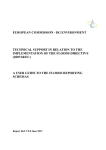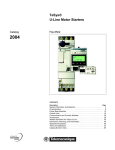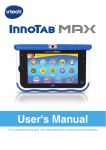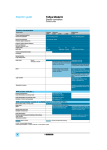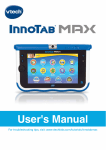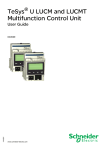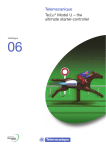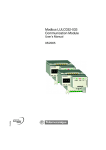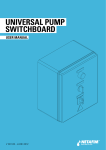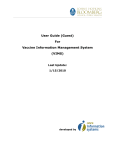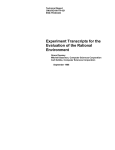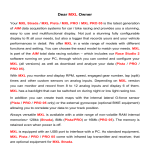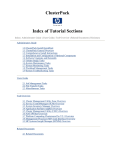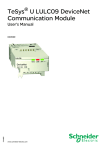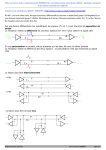Download TeSys U motor starters – open version 1
Transcript
Discover TeSys U motor starters – open version Starter-controller Non-reversing power bases Two types of bases are available, each in two versions: b LUB12, LUB32 Standard power bases: 12 A and 32 A versions. b Advanced power bases for use in conjunction with LUB120, LUB320 function or communication module: 12 A and 32 A versions. Common characteristics b Breaking capacity: 50 kA at 400 V. b Ratings: 12 A or 32 A at 400 V. b Built-in auxiliary contacts: max. operating voltage (Up): 690 V AC, 250 V DC. Max. current (Ith): 5 A 1 NO, 1 NC. b Guaranteed continuity of service (complete coordination) between the protection and control functions to EN 60947-6-2. b Connection by screw clamp terminal. References for Standard power bases Voltage (V) Rating (A) Breaking capacity (kA) Rating (A) Breaking capacity (kA) y 440 V 12 50 500 V 12 10 690 V 9 4 Reference LUB12 Weight (kg) 0.900 32 50 23 10 21 9 LUB32 1.270 The Standard bases are fitted with auxiliary contacts and a fixed terminal block. DB124034 LUB 120, LUB 320 References for Advanced power bases Voltage (V) Rating (A) Breaking capacity (kA) Rating (A) Breaking capacity (kA) y 440 V 12 50 500 V 12 10 690 V 9 4 Reference LUB2 B120 Weight (kg) 0.865 32 50 23 10 21 9 LUB2 B320 0.865 Terminal blocks for Advanced power bases b 3 types of terminal blocks are available, providing different types of pole status remote indication and coil control. b A cover is always supplied for each terminal block so that the top cavity of the base designed to receive the function modules (communication, alarm, etc.) can be closed off, if necessary. DF510904 Terminal block for built-in auxiliary contacts 1 Description 1 Single terminal block for wire remote indication and local coil control DF510920 2 3 DF510922 1 DB124035 LUB 12, LUB 32 1/62 Reference LU9B N11 2 Terminal block with status remote indication cable to communication module LUF C00, LUL C033, ASILUF C51, local coil control LU9B N11C 3 Terminal block with a cable for controlling the coil via communication module LUL C07, LUL C08, LUL C09, LUL C15, wire remote indication LU9B N11L TeSys U motor starters – open version Discover Starter-controller Non-reversing and reversing power bases DB124037 "Reverser" power bases The reverser power bases (non-reversing and reversing) consist of a combined power base and reverser block and are supplied as an assembled unit. They can also be assembled by the customer from units ordered separately. Common characteristics b Ratings: 12 A or 32 A at 400 V. b Built-in auxiliary contacts: max. operating voltage (Up): 690 V AC, 250 V DC Max. current. (Ith): 5 A 1 NO, 1 NC. b Guaranteed continuity of service (complete coordination) between the protection and control functions to EN 60947-6-2. b Connection by screw clamp terminal. References for Reverser power bases Voltage (V) Rating (A) Breaking capacity (kA) Rating (A) Breaking capacity (kA) y 440V 12 50 500 V 12 10 690 V 9 4 Reference LU2 B12•• Weight (kg) 1.270 32 50 23 10 21 9 LU2 B32•• 1.270 Reverser to be assembled: 3 solutions DB124038 DB124036 Vertical mounting Side mounting 1 1 1 5 5 6 5 4 2 3 4 3 4 DF124033 Assembly components Description 9 7 8 1 12 A and 32 A bases Reference LUB 12, 32 1 120 A and 320 A bases LUB 120, 320 2 Prewired reverse control link LU9M R1C 3 Reverser block for vertical mounting LU2M B0•• 4 Single terminal block for built-in auxiliary contacts LU9 M1 5 Terminal block for wired control connection LU9M R1 6 Reverser block for side mounting LU6M B0•• 7 Terminal block with contact status remote indication cable to LULC communication module 9 LU9M RC 8 Terminal block with jumper for controlling the coil via LULC communication module 9 LU9M RL Full power base references One or two letters must be added to the power base reference to identify the control voltage of its coil. Example: LUB12B = 12 A power base with 24 V AC coil control Volts c a 24 BL B – c or a (1) c : 48…72 V, a : 48 V. (2) c : 110…220 V, a : 110...240 V. 48…72 – – ES (1) 110…240 – – FU (2) 1/63 1 Signalling contacts References Non-reversing power base Reminder: TeSys U is similar to a motor protection circuit breaker and a contactor sharing the same power contacts (poles). Monitoring TeSys U protection status DB123009 1 2 Auxiliary contacts are used to identify the operating mode: OPERATION ALLOWED / FAULT-TRIGGERED STOP / OFF They reproduce the status of the rotary handle: (Operation allowed) / TRIP / OFF They can be similar to the contacts of a conventional circuit breaker: v open / closed circuit breaker v OK / tripped. 5 3 6 2 locations for installing the contacts b in the function module cavity: plug-in box 1 b on the side of the power base: side-mounting box . Item Composition Reference Weight (kg) 1 1 SD contact (NC / 95-96) LUA1 C11 0.03 LUA1 C20 0.03 LUA8 E20 0.048 1 4 5 1 OF contact (NO / 17-18) 1 1 SD contact (NO / 97-98) 1 OF contact (NO / 17-18) Covers 3 and 4 for empty cavities are supplied with the basic module. 5 2 OF contacts (NO) Monitoring the pole status of the TeSys U The auxiliary contacts are used to find the status of the load: b ON / OFF b They reproduce the status of the common power contacts (NO contacts) or the reverse status (NC contacts). Auxiliary contacts 6 built into the TeSys U power base Generally used for self-holding 1 NO contact (13-14) built-in 1 NF contact (21-22) built-in b Module with two additional plug-in contacts Used as an extension to the built-in contacts, for automations, signalling. Item 2 2 2 Composition 2 NO contacts (33-34 and 43-44) 1 NC contact (31-32) and 1 NO contact (43-44) 2 NF contacts (31-32 and 41-42) Reference LUF N20 LUF N11 LUF N02 Electrical characteristics of the contacts Use of add-on and auxiliary contacts: ~ or = 24 …250 V, Ith: 5 A. 1/64 Weight (kg) 0.05 0.05 0.05 Signalling contacts References Non-reversing and reversing power base DB124010 Monitoring TeSys U protection status 2 5 3 6 The auxiliary contacts are used to identify the load running mode: b OPERATION ALLOWED / FAULT-TRIGGERED STOP / OFF. They reproduce the status of the rotary handle: (Operation allowed) / TRIP / OFF. They may be similar to the OF (Open/Closed) and SD (Fault indicating) contacts of a conventional circuit breaker. v OF contact: open / closed circuit breaker v SD contact: circuit breaker OK / tripped 2 locations for installing contacts b in a function module cavity: plug-in box 1 b on the side of the power base: side-mounting box Item Composition Reference Weight (kg) 1 1 SD contact (NC / 95-96) 1 OF contact (NO / 17-18) LUA1 C11 0.03 1 1 SD contact (NO / 97-98) 1 OF contact (NO / 17-18) LUA1 C20 0.03 5 2 OF contacts (NO) LUA8 E20 0.048 1 4 Covers 3 and 4 for empty cavities are supplied with the basic module 5 Monitoring the pole status of TeSys U: by auxiliary contacts b The auxiliary contacts are used to find the status of the load: ON / OFF. They reproduce the status of the common power contacts (NO contacts) or the reverse status (NC contacts). Additional plug-in module with 2 auxiliary contacts The contacts built into the power base are used to control the reverser block. To remotely indicate the status of the power poles, one of the following accessories must be used. Item Composition Reference Weight (kg) 2 2 NO contact (33-34) LUF N20 0.05 2 1 NO contact (43-44) 1 NF contact (31-32) LUF N11 0.05 2 2 NF contacts (31-32 and 41-42) LUF N02 0.05 Monitoring the direction of rotation Auxiliary contacts are used to find the direction of the load control: FORWARD / REVERSED. They reproduce the status of the reverser block power contacts. Auxiliary contact 6 built into the reverser block Generally used to indicate the direction of rotation of a motor. 1 reversing contact (82 - 81 - 84). Electrical characteristics of the contacts Use of add-on and auxiliary contacts: ~or = 24 …250 V, Ith: 5 A. 1/65 1 References TeSys motor starters – open version TeSys U starter-controllers Pre-wired system for power connections 2 1 1 Pre-wired system for power connections up to 63 A Description Application Pitch mm 45 Item 54 45 54 45 – – – 54 54 5 tap-offs For unused busbar – outlet – – – 4 8 Sets of 3-pole 63 A busbars 2 tap-offs 3 DB123405 3 tap-offs 4 tap-offs Protective end cover Terminal block for supply to one or more busbar sets 5 6 Sold in lots of 1 Unit reference GV2 G245 Weight kg 0.036 1 1 1 1 GV2 G254 GV2 G345 GV2 G354 GV2 G445 0.038 0.058 0.060 0.77 4 1 1 5 GV2 G454 GV2 G554 GV1 G10 0.085 0.100 0.005 3 1 GV1 G09 0.040 2 1 Pre-wired system for power connections up to 160 A The busbar can be screw-mounted onto any support. DB123401 Set of 4-pole busbars: 3-phase + neutral or 3-phase + common Item Length Mounting in Number of tap-off mm enclosure width units at 18 mm mm intervals 18 5 452 800 Reference Weight kg AK5 JB144 0.900 Removable 3-phase power sockets Thermal Number of points used on the busbar current system 16 2 32 1/66 Item Cable length Sold in lots of Unit reference Weight kg 6 200 6 AK5 PC13 (1) 0.040 6 250 6 AK5 PC33 (1) 0.045 1000 6 AK5 PC33L (1) 0.060 TeSys motor starters – open version References TeSys U starter-controllers Limiter blocks and accessories DB123400 Limiter blocks and accessories Application 7 Item 9 Limiter7 + 9 disconnector (3) (5) Limiter (3) 8 8 Limiter cartridge Clip-in marker holder 9 – Breaking capacity Iq y 440 V 690 V kA kA 130 70 100 35 Mounting Unit reference Weight kg Direct on power base Separate LUA LB1 (2) 0.310 LA9 LB920 0.320 130 70 Limiter-disconnector LUA LF1 0.135 – – On power bases, on LAD 90 (4) reverser block, on parallel link splitter box 0.001 (1) The rated peak current for the power sockets AK5 PC•• is 6 kA. When used in association with power bases LUB••, the prospective short-circuit current must not exceed 7 kA. (2) Supplied with limiter cartridge. (3) These devices make it possible to increase the breaking capacity of the power base. (4) Sold in lots of 100. (5) The limiter must be mounted on an LUB or LU2B power base. The limiter can therefore not be common to several motor starters. Séparateur de phases DB123999 1 Phase barrier LU9 SP0 must be used: b to build a UL 508 Type E certified starter (Self Protected Starter) b without the phase barrier, the starter-controller is certified UL 508 b if the starter-controller is to be used at an operational voltage of 690 V. Description Phase barrier Item 1 Application Mounting LUB or LU2B 12 Direct on or 120 terminals LUB or LUB2B 32 L1, L2, L3 or 320 LUA LB1 Reference Weight kg LU9 SP0 0.030 1/67 1 TeSys motor starters – open version References TeSys U starter-controllers Extended rotary handle DB123407 Allows a circuit-breaker or a TeSys U starter-controller installed in back of an enclosure to be operated from the front of the enclosure. The rotary handle can be black or red/yellow, IP 54 or IP 65. It includes a function for locking the circuit breaker or the starter in the O (OFF) or | (ON) position (depending on the type of rotary handle) by means of up to 3 padlocks with a shank diameter of 4 to 8 mm. The extended shaft must be adjusted to the depth of the enclosure. The IP54 rotary handle is fixed with a nut (Ø 22) to make it easier to assemble. Padlockable external controls Description DB123403 1 2 3 4 5 6 Handle + mounting system kit Universal handle Shaft Shaft support plate for deep enclosure Retrofit accessory Laser Square accessory Padlockable external controls Handle + mounting system kit Description 3 2 Item Reference Black handle, with error status, IP 54 1 LU9 APN21 Weight kg 0.820 Red handle, with error status, IP 54 1 LU9 APN22 0.820 Red handle, without error status, IP 65 1 LU9 APN24 0.820 Black handle, IP 54 2 GV APB54 0.140 Red handle, IP 54 2 GV APR54 0.140 Red handle, IP 65 2 GV APR65 0.140 L = 315 mm 3 GV APA1 0.110 4 GV APK12 0.030 5 GV APP01 0.160 Shaft 4 5 Shaft support plate for deep enclosure Depth u 300 mm Retrofit accessory Sticker (vendu par lot de 10) Warning label French English German Spanish Chinese Portuguese Russian Italian DB123402 1 1 1/68 GV APSFR GV APSEN GV APSDE GV APSES GV APSCN GV APSPT GV APSRU GV APSIT TeSys motor starters – open version References TeSys U starter-controllers Remote controls - small handle Description DB124404 Handle for mounting in the MCC drawer with fixing kit Item 1 + 2 + 3 Reference Weight kg LU9 AP20 0.586 0 RESET TEST 1 2 3 1/69 1 TeSys motor starters - open version Selection TeSys U starter-controllers Control units Operating characteristics 1 Control units Standard LUCA Thermal overload protection Overcurrent protection 3 LUCD Multifunction LUCM 3 to 17 x the setting current 14.2 x the setting current 14.2 x the max. current Short-circuit protection Protection against phase loss 2 Advanced LUCB LUCC Protection against phase imbalance Earth fault protection (equipment protection only) Tripping class Motor type 10 3-phase 10 20 Single-phase 3-phase 5…30 Single-phase and 3-phase Thermal overload test function Overtorque No-load running Long starting time Reset method Manual Automatic or remote With function module, or parameters can be set via the bus with a communication module, see chart below. 4 Thermal overload alarm only with function module or communication module, see below. Alarm 5 “Log” function 6 “Monitoring” function 7 Thermal overload alarm Thermal overload signalling and manual reset With module LUF W With module LUF DH11 Thermal overload signalling and automatic or remote reset With modules LUF DA01 and LUF DA10 With module LUF V Parameters can be set Parameters can be set Parameters can be set via the bus with a communication module (see below). Possible for each type of fault. Indication on front panel of the control unit, via remote terminal, via PC or via PDA (1). With communication modules to make use of these alarms via a bus, see below. Log of the last 5 trips. Number of starts, number of trips, number of operating hours. Display of main motor parameters on front panel of the control unit, via remote terminal, via PC or via PDA (1). With function modules (2) Indication of motor load (analogue) 8 With communication module or via Modbus port on control unit LUCM (2) Starter status (ready, running, fault) Reset method Alarm Remote reset via the bus Indication of motor load 9 With any communication module Parameters can be set via the bus With modules LUL C031, LUL C033, LUL C15, LUL C07, LUL C08 and LUL C09 (thermal overload alarm only). Fault signalling and differentiation Remote programming and monitoring of all functions “Log” function “Monitoring” function Built-in function 10 (1) PDA: Personal Digital Assistant. (2) Mounting possibilities: 1 function module or 1 communication module. 1/70 With module LUL C031, LUL C033, LUL C15, LUL C07, LUL C08 and LUL C09 and Modbus port on the control unit (alarm possible for all types of fault). With modules LUL C031, LUL C033, LUL C15, LUL C07, LUL C08 and LUL C09 and Modbus port on the control unit. Function provided with accessory TeSys motor starters - open version References TeSys U starter-controllers 510913 Standard and advanced control units Description 1 5 2 1 2 3 4 5 Extraction and locking handle Test button (on advanced control unit only) Ir adjustment dial Locking of settings by sealing the transparent cover Sealing of locking handle Standard control units Maximum standard power ratings of 3-phase motors 50/60 Hz 400/440 V 500 V 690 V kW kW kW 4 Setting range Clip-in mounting on power base Rating A A 0.15…0.6 0.35…1.4 1.25…5 3…12 4.5…18 8…32 12 and 32 12 and 32 12 and 32 12 and 32 32 32 Reference, to be completed by adding the voltage code (1) Weight 2 kg Class 10 for 3-phase motors 3 0.09 0.25 1.5 5.5 7.5 15 520735 LUCA pppp LUCB pppp 1 – – 2.2 5.5 9 15 – – 3 9 15 18.5 LUCA X6pp LUCA 1Xpp LUCA 05pp LUCA 12pp LUCA 18pp LUCA 32pp 0.135 0.135 0.135 0.135 0.135 0.135 3 Advanced control units Pressing the Test button on the front panel simulates tripping on thermal overload. Class 10 for 3-phase motors 0.09 0.25 1.5 5.5 7.5 15 – – 2.2 5.5 9 15 – – 3 9 15 18.5 0.15…0.6 0.35…1.4 1.25…5 3…12 4.5…18 8…32 12 and 32 12 and 32 12 and 32 12 and 32 32 32 LUCB X6pp LUCB 1Xpp LUCB 05pp LUCB 12pp LUCB 18pp LUCB 32pp 0.140 0.140 0.140 0.140 0.140 0.140 0.15…0.6 0.35…1.4 1.25…5 3…12 4.5…18 8…32 12 and 32 12 and 32 12 and 32 12 and 32 32 32 LUCC X6pp LUCC 1Xpp LUCC 05pp LUCC 12pp LUCC 18pp LUCC 32pp 0.140 0.140 0.140 0.140 0.140 0.140 0.15…0.6 0.35…1.4 1.25…5 3…12 4.5…18 8…32 12 and 32 12 and 32 12 and 32 12 and 32 32 32 LUCD X6pp LUCD 1Xpp LUCD 05pp LUCD 12pp LUCD 18pp LUCD 32pp 0.140 0.140 0.140 0.140 0.140 0.140 4 5 Class 10 for single-phase motors – 0.09 0.55 2.2 4 7.5 520736 LUB p2 + LUCA pppp – – – – – – – – – – – – 6 Class 20 for 3-phase motors 0.09 0.25 1.5 5.5 7.5 15 – – 2.2 5.5 9 15 – – 3 9 15 18.5 (1) Standard control circuit voltages: Volts 24 48…72 110…240 c BL (2), (3) – – a B – – – ES (4) FU (5) c or a (2) Voltage code to be used for a starter-controller with communication module. (3) d.c. voltage with maximum ripple of ± 10 %. (4) c : 48…72 V, a : 48 V. (5) c : 110…220 V, a : 110...240 V. 7 8 LUB p2 + LUCB pppp 9 10 Characteristics: pages 1/98 and 1/101 Schemes: page 1/115 1/71 TeSys motor starters - open version References TeSys U starter-controllers 510914 Multifunction control units Description 6 1 1 2 3 2 5 LUCMppBL 4 1 2 3 4 5 6 Extraction and locking handle Built-in display window (2 lines, 12 characters) 4-button keypad c 24 V auxiliary power supply Modbus RS485 communication port. Connection by RJ45 connector. Sealing of locking handle The display window 2 and keypad 3 allow: b in configuration mode: local configuration of protection functions and alarms, b in run mode: display of parameter values and events. The Modbus communication port 5 is used to connect: b an operator terminal, b a PC, b a Personal Digital Assistant (PDA). Multifunction control units 3 520737 Parameter entry, monitoring of parameter values and consultation of logs are carried out: b either on the front panel, using the built-in display window/keypad, b or via an operator terminal, b or via a PC or a PDA with PowerSuite software, b or remotely, via a Modbus communication bus. Programming of the product via the keypad requires a c 24 V auxiliary power supply. 4 5 6 LUB p2 + LUCM ppBL Maximum standard power ratings of 3-phase motors 50/60 Hz 400/415 V 500 V 690 V kW kW kW 0.09 – – 0.25 – – 1.5 2.2 3 Setting range Clip-in mounting on power base Rating A 0.15…0.6 0.35…1.4 1.25…5 A 12 and 32 12 and 32 12 and 32 LUCM X6BL LUCM 1XBL LUCM 05BL kg 0.175 0.175 0.175 5.5 7.5 15 3…12 4.5…18 8…32 12 and 32 32 32 LUCM 12BL LUCM 18BL LUCM 32BL 0.175 0.175 0.175 5.5 9 15 9 15 18.5 On CD-Rom Language Reference Multi-language (3) LU9 CD1 Weight kg 0.022 HMI terminal 521335 This compact Magelis terminal enables the parameters of multifunction control unit LUCM to be read and modified. It is supplied pre-configured to provide dialogue with 8 TeSys U starter-controllers (Modbus protocol, application pages and alarm pages loaded). Starter-controller alarm and fault management takes priority. Language 8 Weight TeSys U user’s manual (2) Application 7 Reference (1) Multi-language (3) XBT NU400 Display window Supply voltage Reference 4 lines of 20 characters c 24 V XBT NU400 Length Type Reference 2.5 m SUB-D 25-way female - RJ45 XBT Z938 Weight kg 0.150 Connecting cable (4) Function Connects terminal XBT NU400 to a multifunction control unit. 9 Weight kg 0.200 (1) Input voltage c 24 V with maximum ripple of ± 10 %. (2) The CD-Rom contains user’s manuals for the AS-Interface and Modbus communication modules, multifunction control units and gateway modules, as well as the gateway programming software. (3) English, French, German, Italian, Spanish (4) If a terminal is used with several control units, this cable can be connected to a Modbus hub or to T-junctions (see page 1/95). 10 Characteristics: pages 1/98 and 1/101 1/72 Schemes: pages 1/114 and 1/117 TeSys motor starters - open version References TeSys U starter-controllers Function modules Function modules Output Item Application Reference Weight kg 510915 Thermal overload signalling and manual reset Module LUF DH11 makes it possible to differentiate thermal overload and shortcircuit faults. (The short-circuit fault can then be signalled via add-on contact blocks LUA1 C). The module includes two contacts for thermal overload signalling, as well as an LED on the front panel. To reset the motor starter, the operator must use the rotary knob on the power base. The module can only be used with an advanced control unit and requires an a/c 24…240 V external power supply. 4 3 2 1 N/O + 1 N/C 3 a or c 24…250 V LUF DH11 1 2 0.060 Thermal overload signalling and automatic or remote reset These modules make it possible to differentiate thermal overload and short-circuit faults. (The short-circuit fault can then be signalled via add-on contact blocks LUA1 C). The modules include one contact for thermal overload signalling, as well as an LED on the front panel. A second contact (terminals Z1-Z2) must be wired in series with terminal A1 of the motor starter. In the event of a thermal overload fault, this wiring allows motor control to be switched off. The rotary knob on the power base will then stay in the “ready position” . Resetting of the motor starter is automatic after the required motor cooling time if terminals X1-X2 are linked by a strap, or remote by pulsed closing of a volt-free contact connected to terminals X1-X2. 3 4 These modules can only be used with an advanced control unit and require an a/c 24…240 V external power supply. 510445 LUB p2 + LUCB pppp + LUFW 10 or LUF Vp 1 5 Note: Terminals X1-X2 are not isolated from the signalling module power supply. For remote resetting, use a volt-free contact specific to each module to be reset. 1 N/C 1 N/O 4 4 a or c 24…250 V a or c 24…250 V LUF DA01 LUF DA10 0.055 0.055 Thermal overload alarm Through load shedding, this module makes it possible to avoid stoppages in operation due to overload tripping. Imminent thermal overload tripping is displayed as soon as the thermal state exceeds the threshold of 105 % (hysteresis = 5 %). Signalling is possible via an LED on the front panel of the module and externally by an N/O relay output. It can only be used with an advanced control unit, from which it takes its power. % 200 100 1 2 3 4 1 N/O 1 2.2 kW 2 4 kW 3 7.5 kW 12 mA 20 mA 1 a or c 24…250 V LUF W10 0.055 Indication of motor load This module provides a signal which is representative of the motor load status (I average/Ir). b I average = average value of the rms currents in the 3 phases, b Ir = value of the setting current. The value of the signal (4-20 mA) corresponds to a load status of 0 to 200 % (0 to 300 % for a single-phase load). It can be used with an advanced or multifunction control unit. Module LUF V2 requires a c 24 V external power supply. 4 - 20 mA 2 – LUF V2 6 7 8 0.050 9 10 Characteristics: pages 1/98 and 1/103 Schemes: page 1/116 1/73














